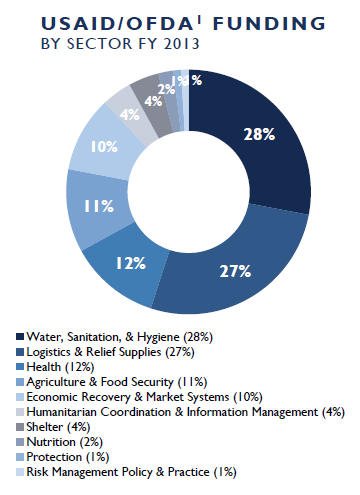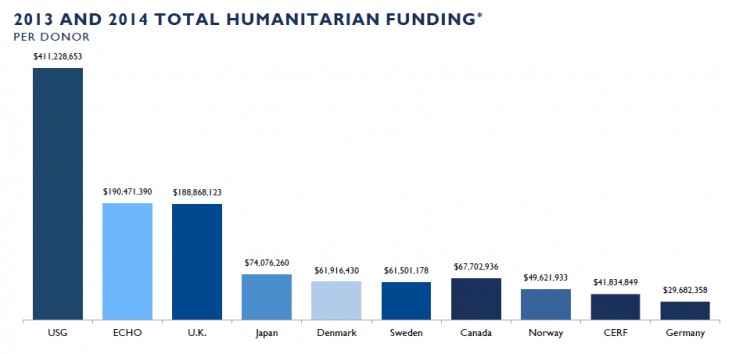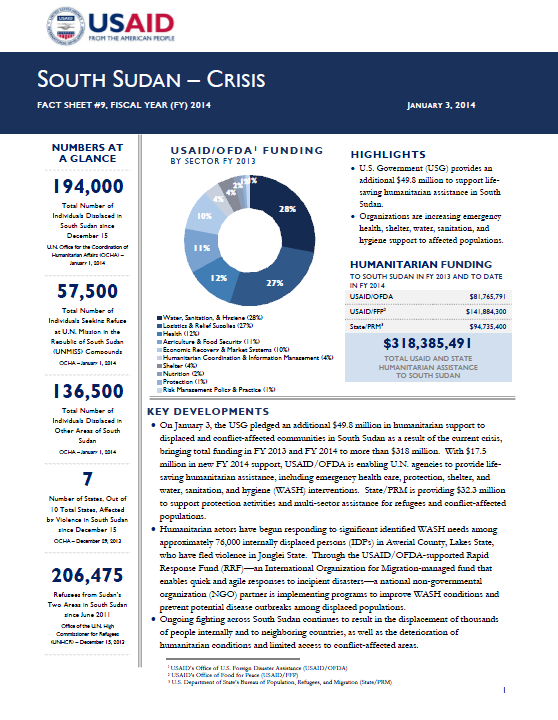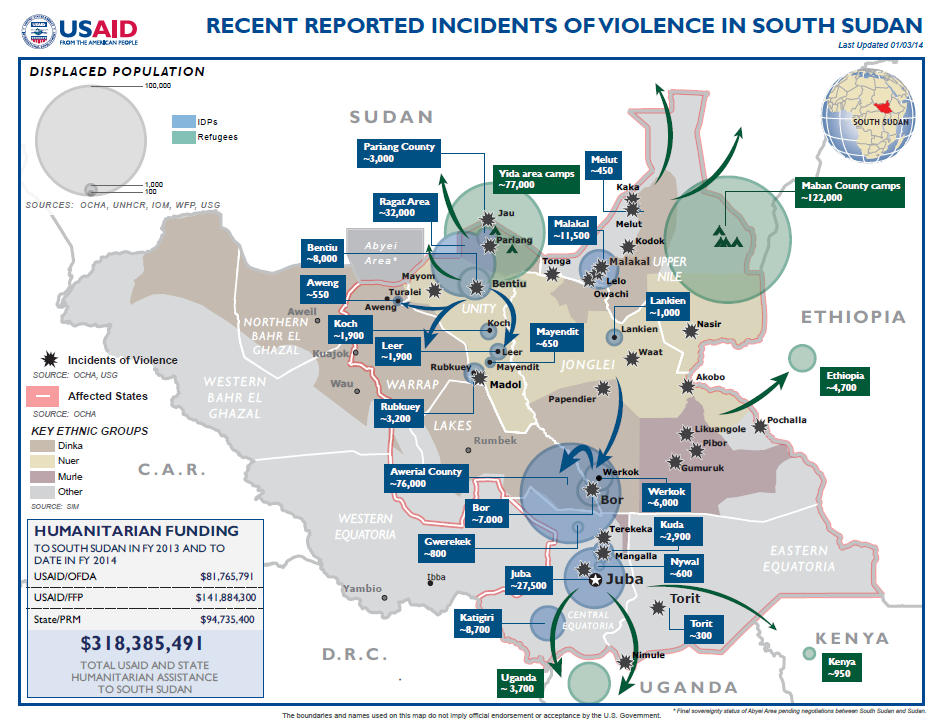- What We Do
- Agriculture and Food Security
- Democracy, Human Rights and Governance
- Economic Growth and Trade
- Education
- Environment and Global Climate Change
- Gender Equality and Women's Empowerment
- Global Health
- Humanitarian Assistance
- Transformation at USAID
- Water and Sanitation
- Working in Crises and Conflict
- U.S. Global Development Lab
Speeches Shim
January 3, 2013
Numbers At A Glance
194,000
57,500
136,500
7
206,475
Humanitarian Funding:
To South Sudan To Date In FY2013 and FY2014:

| USAID/OFDA | $81,765,791 |
| USAID/FFP | $141,884,300 |
| State/PRMDoD | $94,735,400 |
| TOTAL | $318,385,491 |
Highlights
U.S. Government (USG) provides an additional $49.8 million to support life-saving humanitarian assistance in South Sudan.
Organizations are increasing emergency health, shelter, water, sanitation, and hygiene support to affected populations.
KEY DEVELOPMENTS
On January 3, the U.S. Government pledged an additional $49.8 million in humanitarian support to displaced and conflict-affected communities in South Sudan as a result of the current crisis, bringing total funding in FY 2013 and FY 2014 to more than $318 million. With $17.5 million in new FY 2014 support, USAID/OFDA is enabling U.N. agencies to provide life-saving humanitarian assistance, including emergency health care, protection, shelter, and water, sanitation, and hygiene (WASH) interventions. State/PRM is providing $32.3 million to support protection activities and multi-sector assistance for refugees and conflict-affected populations.
Humanitarian actors have begun responding to significant identified WASH needs among approximately 76,000 internally displaced persons (IDPs) in Awerial County, Lakes State, who have fled violence in Jonglei State. Through the USAID/OFDA-supported Rapid Response Fund (RRF)—an International Organization for Migration-managed fund that enables quick and agile responses to incipient disasters—a national non-governmental organization (NGO) partner is implementing programs to improve WASH conditions and prevent potential disease outbreaks among displaced populations.
Ongoing fighting across South Sudan continues to result in the displacement of thousands of people internally and to neighboring countries, as well as the deterioration of humanitarian conditions and limited access to conflict-affected areas.
SITUATION AND DISPLACEMENT UPDATE
The security situation across South Sudan remains tense and unpredictable, with sporadic fighting resulting in fluid population movements and constrained humanitarian access to respond to emergency needs among conflict-affected and displaced populations. Security conditions remain particularly precarious in Jonglei State’s capital of Bor town, where insecurity has prevented humanitarian organizations from transporting relief supplies to the town via air assets. Meanwhile, continued fighting in Upper Nile State has reportedly displaced additional populations in areas near Malakal town.
The U.N. reports that protection remains a priority concern due to an unknown number of civilian casualties in areas of active hostilities, as well as reports of physical abuse and the targeting of civilians based on ethnicity and political affiliation.
South Sudan Crisis Fact Sheet #9 January 3, 2014 ![]() (pdf - 332k)
(pdf - 332k)
HUMANITARIAN NEEDS AND RESPONSE ACROSS SOUTH SUDAN
Relief agencies are providing humanitarian assistance to populations sheltering at UNMISS bases in Juba through the distribution of emergency food rations and relief commodities, including blankets, plastic sheeting, mosquito nets, water containers, and household items.
Highly concentrated living conditions at the two UNMISS Juba sites, as well as limited WASH infrastructure, increase the risk of disease outbreaks, particularly waterborne illnesses. Through the USAID/OFDA RRF, two national NGOs are providing emergency health services, supporting improved sanitation, and conducting hygiene promotion in U.N. House 3 to address these concerns. In addition, relief agencies are exploring options to expand areas to host IDPs in Juba to mitigate space constraints and inter-communal tensions.
Humanitarian agencies continue efforts to provide critical emergency assistance to areas outside of Juba, as security, staffing, and access permit, and are scaling up assessment activities to identify priority needs among affected communities. Using RRF support, a local partner is constructing communal latrine blocks, hand-washing stations, and bathing facilities, as well as conducting hygiene promotion activities in rural areas of Awerial County, Lakes State, where more than 76,000 IDPs have gathered.
South Sudan Crisis Map #9 January 3, 2014 ![]() (pdf - 404k)
(pdf - 404k)
USG COUNTRYWIDE HUMANITARIAN ASSISTANCE
The USG continues to respond to emergency humanitarian needs among affected populations in South Sudan, with $49.8 million in new FY 2014 funding from USAID/OFDA and State/PRM. In addition to these new funds, USAID/FFP is re-directing a portion of $90 million in support to the U.N. World Food Program (WFP) to support protracted relief and recovery operations, while USAID/OFDA is also working with NGO partners to re-orient ongoing programs to meet emergency needs arising from the current crisis.
With $4 million to UNICEF, USAID/OFDA is supporting nutrition, protection, and WASH interventions in South Sudan. UNICEF is pre-positioning nutrition supplies in strategic locations to support robust relief operations in conflict-affected areas and monitor malnutrition among displaced populations. In response to countrywide protection needs, UNICEF is delivering emergency hygiene kits and supplies for women and girls, as well as supporting measures to improve child protection mechanisms and establish support systems for survivors of gender-based violence. In addition, UNICEF is identifying, registering, and reunifying separated families and establishing 15 child-friendly spaces in displacement sites. As the WASH Cluster lead, UNICEF is also improving WASH activity coordination efforts, and developing contingency plans at national, state, and local levels.
With $1 million from USAID/OFDA, the U.N. World Health Organization (WHO) is working to provide operational support to mobile clinics to improve access to health services focusing on women and children, maintain technical staff for emergency health services, and rapidly deploy experienced professionals in acute health emergencies. WHO is also establishing an emergency management system to better prepare for, detect, and contain infectious disease outbreaks should they occur.
USAID/OFDA is providing $2.5 million to OCHA to support humanitarian coordination and information management efforts, $8 million to support the U.N. Humanitarian Air Service (UNHAS) and other air assets to facilitate the movement of humanitarian personnel and supplies within South Sudan , and $1 million to WFP to provide much-needed coordination for these logistics efforts.
2013 TOTAL HUMANITARIAN FUNDING*

**Funding figures are as of January 3, 2014. All international figures are according to OCHA’s Financial Tracking Service and based on international commitments during the 2013 calendar year, while USG figures are according to the USG and reflect the most recent USG commitments based on the 2013 fiscal year, which began on October 1, 2012, and ended September 30, 2013, as well as the 2014 fiscal year, which began on October 1, 2013.



Comment
Make a general inquiry or suggest an improvement.